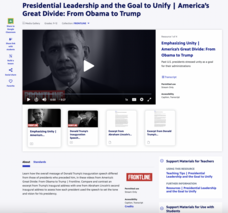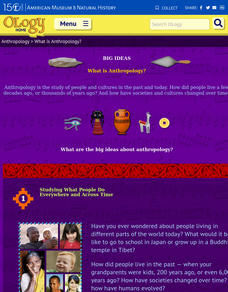Anti-Defamation League
What "Draw-A-Scientist" Reveals about Gender Stereotypes
What do you picture when you hear the word scientist? Challenge scholars to put pencil to paper, draw a scientist, and then reflect on the patterns they observe. Learners read an article about a female scientist and write a story about a...
PBS
George Washington Carver: Scientist, Inventor, and Teacher
Using video clips along with primary and secondary documents, scholars analyze the life of George Washington Carver, one of America's best scientists and inventors. Class members then create music, posters, and skits about this amazing...
A Mighty Girl
Cynthia Breazeal
MIT Professor Cynthia Breazeal is a pioneer in the field of social robotics. Introduce your classes to this amazing woman with a colorful poster that details some of her many accomplishments.
The New York Times
Where to Draw the Line: Balancing Government Surveillance with the Fourth Amendment
The question of how to balance Fourth Amendment Rights with national security concerns becomes critical in an age of planned terrorist attacks, election interference, and fake news. Get young social scientists involved in the debate with...
Learning for Justice
The Color of Law: Creating Racially Segregated Communities
It is pointed, powerful, and painful! The first of three lessons about laws and practices that support inequality looks at how government policies created and reinforced segregated communities. Young social scientists read excerpts from...
Anti-Defamation League
What are Reparations and Should We Enact Them?
Young social scientists investigate recent legislative proposals for reparations for African Americans. They examine the rationale behind the proposals by viewing videos and reading related articles. To close the instructional activity,...
Greater Good Science Center
See The Good Challenge
Scientists study all sorts of things. For example, studies show that it feels good to feel grateful. Feeling grateful also contributes to physical health and strengthen relationships. In the second lesson about gratitude, class members...
Museum of the American Revolution
Leadership and Alexander Hamilton
Alexander Hamilton serves as a model in a instructional activity that asks young political scientists to consider the strengths and weaknesses of six different leadership styles. They read a brief overview of Hamilton's activities...
PBS
Presidential Leadership and the Goal to Unify | America’s Great Divide: From Obama to Trump
Traditionally, a United States President's Inaugural Address establishes the tone and vision for his presidency. It has stressed the goal to unify the country and bring the political parties together after what are often divisive...
PBS
Alexander Graham Bell: Scientist, Inventor, and Teacher
Hello? Hello? Scholars investigate the impact Alexander Graham Bell's telephone had on the American landscape. Using drawings, video clips, and primary sources, the mind of the inventor comes to light as pupils dream of new inventions to...
Global Oneness Project
Living with Less Water
Did you know that California produces two thirds of the fruits and nuts consumed in the United States? That it produces almost one third of the vegetables? Did you know that scientists warn that California is facing the onset of a...
American Museum of Natural History
What is Anthropology
A colorful resource introduces learners to the four major fields of anthropology: cultural anthropology, linguistic anthropology, biological anthropology, and archaeology. Explanations are provided for what each field studies, the kinds...
Channel Islands Film
Arlington Springs Man: Lesson Plan 3
Imagine being part of a team of scientists that discover the oldest human remains in North America. Imagine being part of the crew that documents this discovery. Class members get a change to be part of such an exciting adventure in a...
Channel Islands Film
Sa Hi Pa Ca (Once Upon a Time): Lesson Plan 2
What tools do archaeologists and anthropologist use to learned about what life was like in the past. After watching West of The West's documentary Once Upon a Time that details how scientists use artifacts to establish a history of the...
National Park Service
The Young Naturalist
Beginning with a brief history of our 26th president, Theodore Roosevelt, then followed by a discussion of his interest in nature, young scientists take to the outdoors to locate and observe local plants and insects. Scholars return to...
American Museum of Natural History
Create Your Own Time Capsule
The corona virus pandemic is indeed a historic event. A time capsule activity permits young historians to document these days of social distancing, remote learning, and quarantine by collecting artifacts that capture what their lives are...
C3 Teachers
Black Genius: How Did Black Genius Help Build American Democracy?
"How did the slavery system undermine the United States' democratic principles?" This question launches a study of how the Preamble to the Declaration of Independence, Article I, Section 2 of the U.S. Constitution, and Article IV,...
Anti-Defamation League
Representing the People: Diversity and Elections
After studying statistics and reading articles about diversity in the 2018 through 2020 U.S. elections, young social scientists discuss what they believe is the impact of having more diverse elected officials. Individuals then select one...
Alabama Department of Archives and History
America in Space: German Voices from Huntsville, Alabama
Project Paperclip, the Redstone Arsenal, and the Huntsville Space Center are all featured in a resource that investigates the contributions of Dr. Werner von Brawn and other German scientists to the US space program. Working individually...
Channel Islands Film
Island Rotation: Lesson Plan 1
How do scientists provide evidence to support the theories they put forth? What clues do they put together to create these theories? After watching West of the West's documentary Island Rotation class members engage in a series of...
US National Archives
Benjamin Franklin: Politician and Diplomat
A scientist, inventor, entrepreneur, politician, and the founder of a nation—and that's just one person! Learners investigate the many lives of Benjamin Franklin. Using a hands-on interactive online resource, they analyze primary...
Constitutional Rights Foundation
The Troubled Elections of 1796 and 1800
Congress does more than create new laws. Political scientists delve into the elections of 1796 and 1800 to understand how political parties, the Electoral College, and personal agendas affected the election process. The resource also...
Encyclopedia Britannica
Beyond a Two-Party System
Young political scientists go beyond the two-party system and research third-party candidates running in the 2020 US Presidential election. Groups present background information about the candidate, the party's platform points, and a...
Encyclopedia Britannica
Meta-Study: Political Brains
Are there differences in the brains of liberals and conservatives? That is the question young political scientists are challenged to answer. Class members examine studies, consider how the results are presented, and how the studies were...

























